
[ad_1]
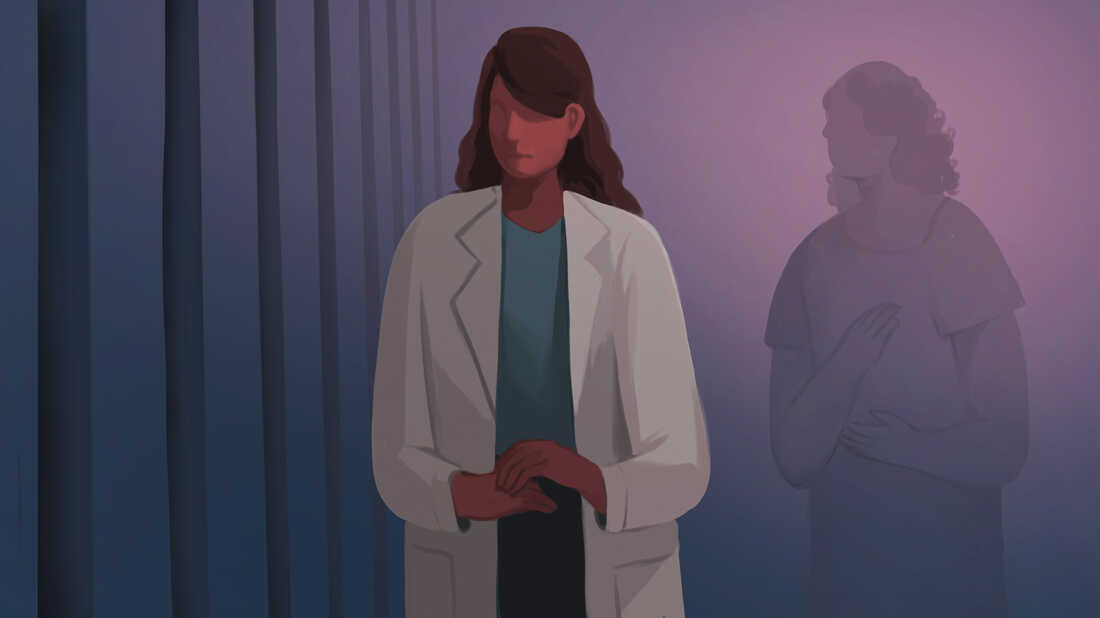
American Medical Association President Dr. Jack Resneck lately recounted how medical doctors across the nation are going through difficulties training medication in states that ban abortion.
Nicole Xu for NPR
disguise caption
toggle caption
Nicole Xu for NPR

American Medical Association President Dr. Jack Resneck lately recounted how medical doctors across the nation are going through difficulties training medication in states that ban abortion.
Nicole Xu for NPR
Since Roe v. Wade was overturned, 13 states have banned abortion besides within the case of a medical emergency or severe well being threat for the pregnant affected person. But deciding what circumstances qualify for a medical exception generally is a tough judgement name for medical doctors.
News reviews and courtroom affidavits have documented how well being care employees generally deny ladies abortion procedures in emergency conditions – together with NPR’s story of a girl who was initially not handled for her miscarriage at an Ohio ER, although she’d been bleeding profusely for hours.
In Missouri, hospital medical doctors informed a girl whose water broke at 18 weeks that “current Missouri law supersedes our medical judgment” and so she couldn’t obtain an abortion process though she was vulnerable to an infection, according to a report within the Springfield News-Leader.
That hospital is now under investigation for violating a federal legislation that requires medical doctors to deal with and stabilize sufferers throughout a medical emergency.
And a survey by the Texas Policy Evaluation Project discovered clinicians generally averted normal abortion procedures, opting as an alternative for “hysterotomy, a surgical incision into the uterus, because it might not be construed as an abortion.”
“That’s just nuts,” Dr. Matthew Wynia says. He’s a doctor who directs the Center for Bioethics and Humanities on the University of Colorado. “[A hysterotomy is] much more dangerous, much more risky – the woman may never have another pregnancy now because you’re trying to avoid being accused of having conducted an abortion.”
Reports like these prompted Wynia to publish an editorial within the New England Journal of Medicine in September, calling for physicians and main medical establishments to take a stand towards these legal guidelines via “professional civil disobedience.” The manner he sees it, no physician ought to choose to do a process which will hurt their affected person – or delay or deny care – due to the worry of prosecution.
“I have seen some very disturbing quotes from health professionals essentially saying, ‘Look, it’s the law. We have to live within the law,'” he says. “If the law is wrong and causing you to be involved in harming patients, you do not have to live [within] that law.”
These points have raised a rising debate in medication about what to do within the face of legal guidelines that many medical doctors really feel drive them into moral quandaries.
Medical organizations elevate the problem
At the American Medical Association’s November assembly, president Dr. Jack Resneck gave an address to the group’s legislative physique, and recounted how medical doctors across the nation have run into problem training medication in states that ban abortion.
“I never imagined colleagues would find themselves tracking down hospital attorneys before performing urgent abortions, when minutes count, [or] asking if a 30% chance of maternal death or impending renal failure meet the criteria for the state’s exemptions, or whether they must wait a while longer until their pregnant patient gets even sicker,” he stated.
The AMA passed resolutions on the assembly to direct a process drive to create a authorized protection fund and authorized technique for physicians who’re prosecuted for offering abortions when that’s the medical normal of care.
Not all medical doctors agree that the abortion restrictions are chargeable for harming sufferers. Dr. Christine Francis of the American Association of Pro-Life Ob-Gyns, has written that the suggestion that these legal guidelines intrude with the remedy of miscarriages, ectopic pregnancies and different life-threatening circumstances is “absurd.”
She told a congressional subcommittee this summer season that Ob-Gyns’ “medical expertise and years of training make it very possible for us to discern when we need to intervene to save a woman’s life.”
But Wynia says it is putting how united almost all medical skilled teams have been in repudiating the Supreme Court’s choice to overturn Roe v. Wade; they’ve argued primarily that it is thrown the medical subject into chaos and threatens the integrity of the career. He’s now calling for these teams to again these statements up with substantive help for medical doctors who get in hassle for defying legal guidelines.
A historical past of civil disobedience
Physician civil disobedience performed a job in legalizing abortion a long time in the past. Before the early twentieth century, there was “almost a ‘don’t ask, don’t tell’ kind of silence” round physicians offering abortions, says Mary Ziegler, a authorized historian at U.C. Davis who specializes within the historical past of abortion.
“By the 1940s, you get more of a crackdown on abortion, and it’s framed as a vice or a racket — the same language you’d be using against organized crime,” says Zielger. “In the 1950s, hospitals begin forming therapeutic abortion committees in part to protect themselves from prosecution or lawsuits,” she says, so abortions could possibly be allowed in sure circumstances, like emergencies.
But some medical doctors felt that wasn’t sufficient. Allowing abortions when somebody’s loss of life is imminent could also be simple, however what about when somebody has a coronary heart situation and being pregnant makes that situation worse? Or if a affected person tells their physician, ‘If I can not get an abortion, I’m going to hurt myself’? Ziegler says some medical doctors wished extra leeway to comply with their conscience and supply abortions in additional conditions.
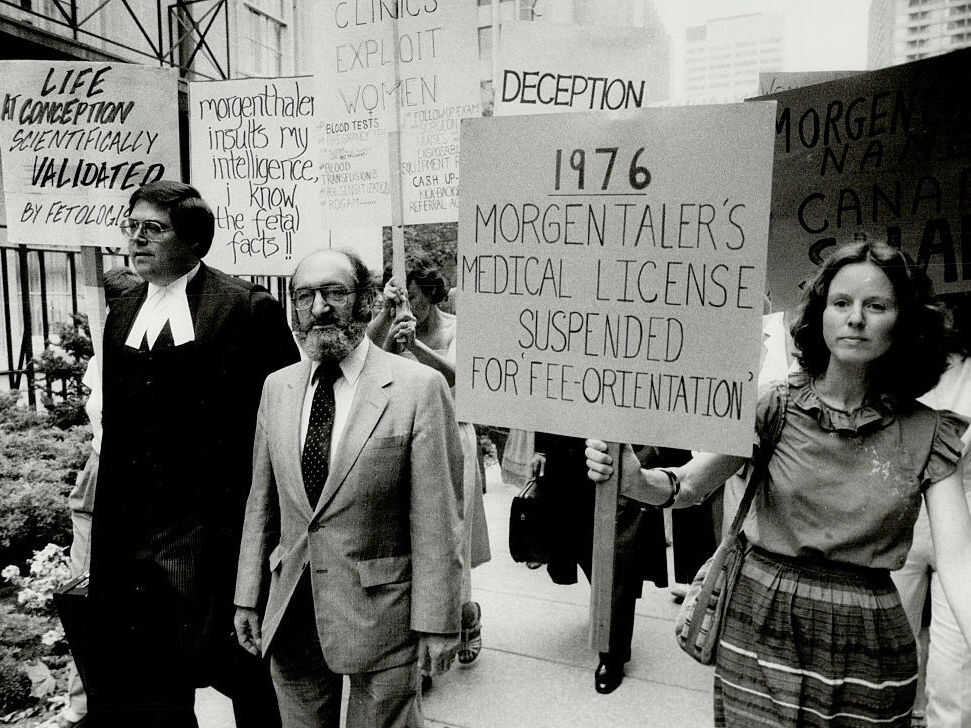
Canadian Dr. Henry Morgentaler informed biographer Catherine Dunphy why he determined to carry out abortions in defiance of bans. “The law was barbarous, cruel and unjust. I had been in a concentration camp, and I knew what suffering was,” he stated. “If I can ease suffering, I feel perfectly justified in doing so.”
Michael Stuparyk/Toronto Star by way of Getty Images
disguise caption
toggle caption
Michael Stuparyk/Toronto Star by way of Getty Images
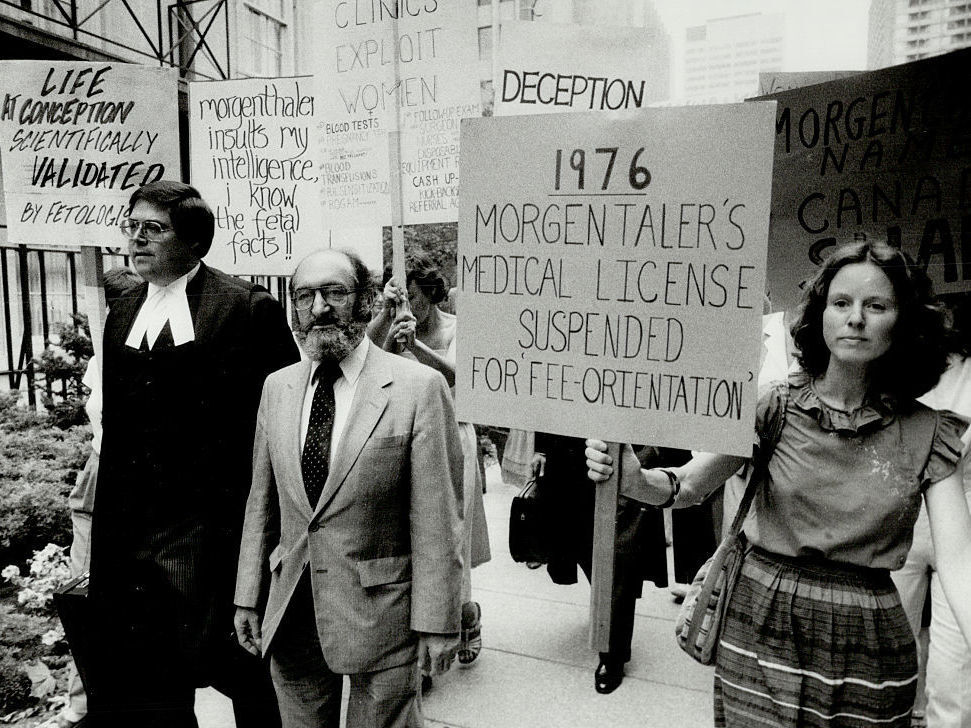
Canadian Dr. Henry Morgentaler informed biographer Catherine Dunphy why he determined to carry out abortions in defiance of bans. “The law was barbarous, cruel and unjust. I had been in a concentration camp, and I knew what suffering was,” he stated. “If I can ease suffering, I feel perfectly justified in doing so.”
Michael Stuparyk/Toronto Star by way of Getty Images
Then, within the Sixties, within the interval main as much as Roe v. Wade, “some people then begin not just getting arrested because they happen to get caught, but trying to get arrested,” she says, as a manner to attract consideration to what they noticed as imprecise or unworkable abortion legal guidelines.
In Washington, D.C., Dr. Milan Vuitch was arrested 16 times for offering unlawful abortions. In California, Dr. Leon Belous was convicted for referring a girl for an abortion in 1967. He appealed his case all the way in which to the state supreme court and won.
And in Canada, Dr. Henry Morgentaler was imprisoned for brazenly violating abortion legal guidelines. His notoriety got here with dangers — he obtained loss of life threats and his Toronto clinic was firebombed twice. But in the end the circumstances introduced towards him helped to progressively legalize abortion throughout that nation.
The image may be very totally different immediately, not less than up to now. In the 5 months for the reason that Supreme Court overturned Roe v. Wade, main medical associations inform NPR they don’t seem to be conscious of any well being care employees who’ve really been charged with offering an abortion in violation of those new state legal guidelines.
One cause that there is extremely unlikely to be one other Morgentaler now, says Ziegler, is as a result of, “in the pre-Roe era often if you violated an abortion law, most people didn’t really face much real prison time.” Now, many of those state legal guidelines have been written explicitly to criminalize doctors, with penalties that embrace felony prices, jail time, fines, and the lack of their medical license and livelihoods. The most penalty for medical doctors who violate Texas’s abortion ban is life in jail.
The nation has settled into an “uneasy reality,” she says, the place medical doctors aren’t offering abortions in locations the place it is unlawful — together with in some emergency conditions the place abortion is technically allowed underneath the brand new restrictive laws — and prosecutors aren’t bringing prices. But she says that this would possibly not final eternally, whether or not as a result of prosecutors get extra aggressive, or as a result of medical doctors start to push the boundaries of those legal guidelines extra.
Freedom and livelihood in danger
Medical care may be very totally different than it was in midcentury America. It’s not a “lone wolf” enterprise anymore: Doctors are sometimes employed in company methods the place each little merchandise is tagged and a number of individuals are concerned in each choice. Even in the event that they wish to defy the legislation or boldly skirt the sting of it, their employers could not allow them to — or a colleague may flip them in.
And medical doctors who’re public about offering abortions say they already face an enormous quantity of threat.
“Just going to work in the morning risks my life,” says Dr. Katie McHugh, an Ob-Gyn primarily based in Indiana who offers abortions — Indiana has a legislation banning abortion, however it’s at the moment blocked by the courts. NPR has reported on elevated threats to abortion clinics and suppliers lately.
“There is no way that I would risk my personal freedom and jail time for providing medical care,” McHugh says. “I would love to show my children that I am brave in the world, but our society will not allow me to be a civil-disobedient citizen in the way that some of these articles suggest, because I would be imprisoned, I would be fined, I would lose my license and I very well could be assassinated for doing that work.”
And in immediately’s surroundings, getting arrested for defying abortion legal guidelines on goal may not really be efficient in getting legal guidelines modified, factors out Dr. Louise King, director of reproductive bioethics for the Center for Bioethics at Harvard Medical School and an Ob-Gyn surgeon at Brigham and Women’s Hospital.
King — who herself offers abortion care in Massachusetts, the place it’s authorized as much as 24 weeks — lays out what would occur if she have been to get arrested deliberately in Texas, for instance, the place she went to medical college and did her residency.
“It’s probable in Texas I’d lose the case,” she says. “And then am I going to win it in the Supreme Court? No.”
For these causes, she’s skeptical of calls to brazenly defy abortion legal guidelines and invite arrest. “I don’t even see the point,” King says. She provides that one other consideration is how few suppliers there are who do abortion care — any physician who’s sitting in jail or ready for a authorized battle to resolve is one fewer one who’s capable of deal with sufferers.
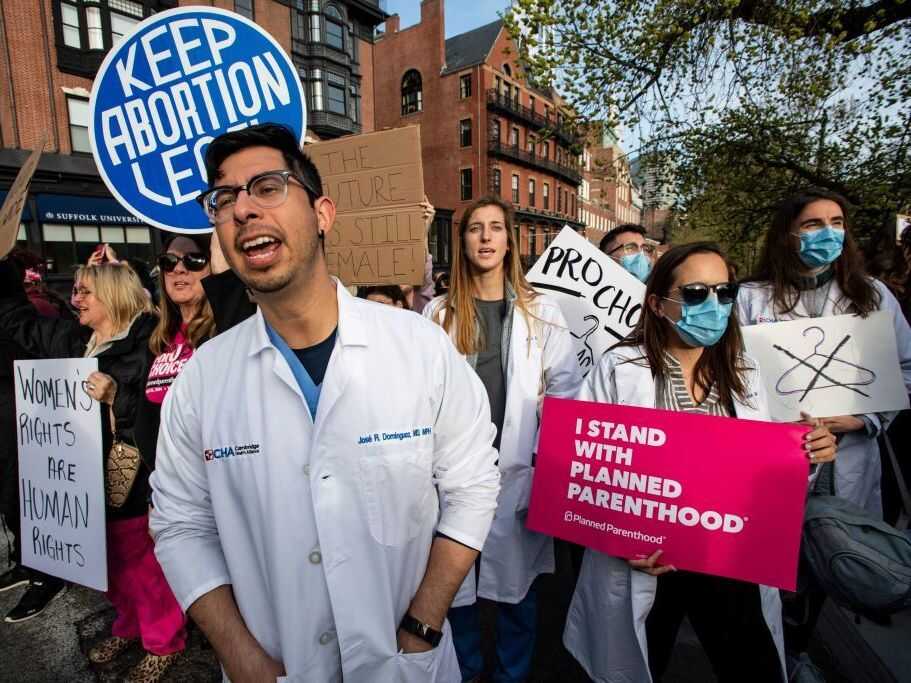
A bunch of medical doctors and medical employees protested in help of abortion rights in Boston, Mass., May 3, 2022 when the Supreme Court was poised to strike down the suitable to abortion within the U.S. Many medical doctors consider that outlawing abortion infringes on their skill to follow medication ethically.
JOSEPH PREZIOSO/AFP by way of Getty Images
disguise caption
toggle caption
JOSEPH PREZIOSO/AFP by way of Getty Images

A bunch of medical doctors and medical employees protested in help of abortion rights in Boston, Mass., May 3, 2022 when the Supreme Court was poised to strike down the suitable to abortion within the U.S. Many medical doctors consider that outlawing abortion infringes on their skill to follow medication ethically.
JOSEPH PREZIOSO/AFP by way of Getty Images
Practicing as much as the restrict of the legislation
Still, there could also be some center floor for medical doctors, between going to jail and failing to supply the care they really feel is required, argues Katie Watson, a bioethicist and professor of legislation and humanities at Northwestern University’s medical college. In most of the reported circumstances during which sufferers have been endangered as a result of medical doctors denied or delayed mandatory care, she says civil disobedience wasn’t referred to as for. Instead, medical doctors must turn into extra comfy working as much as the boundaries of the legislation.
“My perspective is that interpreting life and health exceptions to be consistent with standard medical practice is not lawbreaking,” she says. Those legal guidelines are typically meant to dam elective abortions, and most have exceptions for medical emergencies. Plus, the federal authorities requires hospitals to stabilize sufferers, including when they need abortion procedures.
She acknowledges the authorized dangers and stiff penalties clinicians face, however says they should higher perceive the authorized protections they do have.
“Legislatures have put clinicians in a very terrible place, and it needs to change,” she asserts. “And at the same time, clinicians need to step up in this moment and learn what the laws really do and do not prohibit and practice to the full scope that they can.”
For medical doctors who do wish to extra immediately defy abortion legal guidelines, and supply abortions when there isn’t any medical emergency, Watson attracts a distinction between doing it publicly to make a degree — civil disobedience — and “covert disobedience,” which is privately resisting the legislation.
“That is when you believe a law is unjust and you do not believe disobeying it in public will change it, but there is an identified other in danger in front of you that you have the resources to help,” she explains. “So that’s the Underground Railroad, that’s hiding Jews from the Nazis — there’s a long tradition of that as well.”
Some abortion suppliers are taking that sort of strategy. “They’ve got all these referral systems and they’re sending patients around to different places to get care,” King says. “They’re mobilizing and [doctors] are moving and practicing in different states.”
In these methods, she says, abortion suppliers are ensuring their sufferers can nonetheless get care with out risking their livelihoods and private freedom — a stepped-up model of what they’ve been doing for years.
Support for medical doctors who take dangers
Ultimately, well being care employees want extra institutional help within the face of legal guidelines they could really feel are pushing them to violate their moral obligations, says Wynia.
“This is a leadership issue,” he argues. He labored for 18 years on the AMA, working the Institute for Ethics and the Center for Patient Safety. “There will be individual doctors who presumably will end up in court. And then the question will arise: Were they supported? Can they be supported?”
He needs organized medication, accrediting organizations, and medical amenities like hospitals to unite in saying clearly that they may help clinicians who resolve to comply with the usual of take care of a affected person, even when which will violate state abortion legal guidelines.

From left: Sen. Jacky Rosen (D-NV) and Sen. Patty Murray (D-OR) look on as Dr. Nisha Verma of Physicians for Reproductive Health speaks about reproductive rights at a information convention outdoors the U.S. Capitol in Washington, August, 2022.
Drew Angerer/Getty Images
disguise caption
toggle caption
Drew Angerer/Getty Images
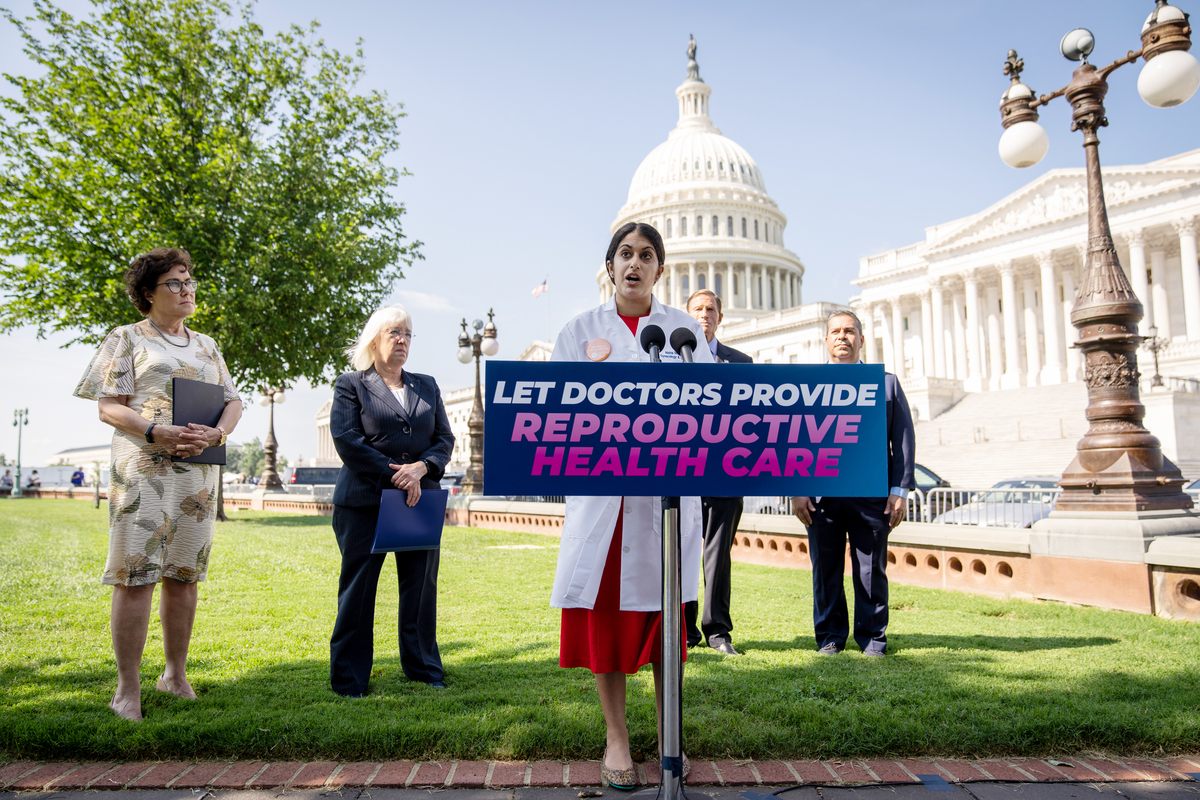
From left: Sen. Jacky Rosen (D-NV) and Sen. Patty Murray (D-OR) look on as Dr. Nisha Verma of Physicians for Reproductive Health speaks about reproductive rights at a information convention outdoors the U.S. Capitol in Washington, August, 2022.
Drew Angerer/Getty Images
Strong management on the institutional stage may embolden medical doctors to comply with their medical judgment and trigger fewer situations of medical doctors delaying care to seek the advice of authorized specialists, Wynia says. In the face of powerful circumstances, he hopes medical doctors will assume, “If we do the right thing, we may end up in court, but we know we’re not alone in this — we know we’ve got the whole medical establishment behind us.”
AMA’s resolutions earlier this month to help the medical doctors who do get charged sooner or later for offering abortions in step with medical ethics and requirements of care are a superb first step, he says. Those insurance policies give course to a process drive to supply insurance policies, authorized methods and monetary assets, however there isn’t a timeline for extra particulars on what form that may take.
In the long run, King, the bioethicist and surgeon at Harvard, says no quantity of institutional help for medical doctors or requires disobedience will repair how these abortion restrictions hamstring medical doctors, which may hurt sufferers. “If we want to make change, we’ve got to change the laws,” she says, and which means voting and political organizing and in any other case utilizing the democratic course of.
[adinserter block=”4″]
[ad_2]
Source link

